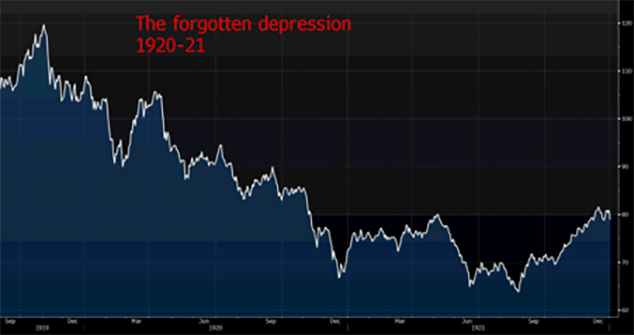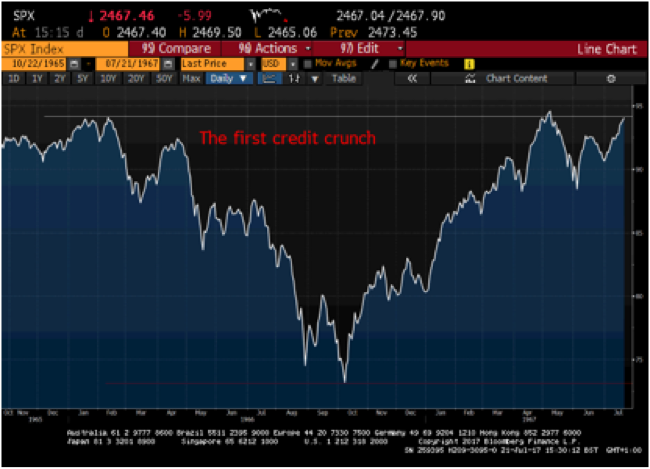How Britain avoided the worst of the Great Depression
For Britain, the Great Depression really wasn’t especially great, or particularly depressing. John Stepek explains why.

Get the latest financial news, insights and expert analysis from our award-winning MoneyWeek team, to help you understand what really matters when it comes to your finances.
You are now subscribed
Your newsletter sign-up was successful
Want to add more newsletters?

Twice daily
MoneyWeek
Get the latest financial news, insights and expert analysis from our award-winning MoneyWeek team, to help you understand what really matters when it comes to your finances.

Four times a week
Look After My Bills
Sign up to our free money-saving newsletter, filled with the latest news and expert advice to help you find the best tips and deals for managing your bills. Start saving today!
For the last month or so, I've been talking about the Great Depression the run up to it, the unfolding of the Crash of 1929, and the aftermath.
But clearly, it's mostly been US-focused. And maybe you're wondering, what was going on in Britain at this time? How come we don't really have the same folk memory of the Great Depression?
Well, there's a very good reason for that.
MoneyWeek
Subscribe to MoneyWeek today and get your first six magazine issues absolutely FREE

Sign up to Money Morning
Don't miss the latest investment and personal finances news, market analysis, plus money-saving tips with our free twice-daily newsletter
Don't miss the latest investment and personal finances news, market analysis, plus money-saving tips with our free twice-daily newsletter
The truth is that for Britain, the Great Depression really wasn't especially Great, or particularly Depressing...
There was no booming Britain in the 1920s
The 1920s was a boom era for the US. For Britain, though, the 1920s were hardly roaring. Things weren't tough all over; London was swinging, as ever, but in the industrial areas (pretty much everywhere else), life was hard and unemployment was high.
This is the first key point to grasp about Britain's relatively mild experience in the Great Depression we didn't have a massive bust because we didn't have a massive boom either.
The US was the big winner from the First World War. Europe, on the other hand, was now broke. And of all the major powers, Britain was most committed to repaying its debts and regaining its pre-war financial position in effect, we wanted to restore sterling as the global reserve currency.
That meant maintaining relatively tight monetary and fiscal policies. As Liaquat Ahamed puts it in is book, Lords of Finance, "Britain had pursued the most orthodox and prudent financial policies of any European power, and had been rewarded with the highest unemployment rate in Europe and a limping economy."
Then, in 1925, under the chancellorship of Winston Churchill, Britain went back onto the gold standard. In other words, the value of the pound was fixed to gold at a specific level. And because America owned most of the gold, we were in effect locked into a fixed exchange rate against the US dollar.
It's worth noting that Churchill not a man who could ever be accused of fiscal responsibility himself was never keen to go back onto the gold standard. And he later saw it as one of the biggest mistakes he ever made.
As Ahamed explains, Churchill had a pretty good grasp of the situation, even although he had no economics background. But Montagu Norman, governor of the Bank of England, was wedded to the idea of returning to gold. Norman won.
A pound was now valued at $4.86 the pre-war exchange rate. The idea of the pound ever being worth nearly $5 is quite staggering now, and the reality is, it wasn't worth it then either. America was on its way to being the pre-eminent power, and Britain was passing the baton. We were overvalued, and they were undervalued.
It's tough exporting goods when your currency is too high. And it's hard to get out of debt and we were very indebted at the time when the "real" value of your debt keeps rising because of rampant deflation (Britain was stuck with deflation from around 1926 to 1934).
This made the misery in the industrial parts of Britain even worse, and meanwhile, the national balance sheet continued to deteriorate. Efforts to balance budgets merely made things worse. And the crash of 1929 and resulting collapse in global trade was the last straw.
Something had to give. So in 1931, amid much political upheaval, Britain came off the gold standard (the US would do something very similar in 1971).
Everyone thought it'd be the end of the world. In terms of how it looked, it was embarrassing for the country. And it certainly rattled global markets.
Indeed, to get a flavour of how unthinkable it was, I'll give you a passage from Piers Brendon's excellent book on the 1930s, The Dark Valley. When a journalist had suggested the idea of abandoning the gold standard:
"Sir Warren Fisher, head of the Civil Service and permanent secretary to the Treasury, got to his feet, his eyes flashing, his face flushed with passion' and said that any such suggestion is an affront to national honour' and quite unthinkable'".
A week later, the deed was done. As the saying goes, never believe anything until it's officially denied.
How Britain evaded the worst of the Great Depression
But really, despite the histrionics, in abandoning the gold standard, Britain was simply rectifying its earlier error. The outcome was very similar to what happened in 1992, when Britain left the European Exchange Rate Mechanism.
Once sterling's link with gold was severed, Britain was able to cut interest rates, the threat of deflation was eliminated, and exports picked up too, because the value of sterling cratered. Monetary policy was easy, whereas in the US for example, it was tight.
And yet, because the rest of the world was struggling too, import prices still fell, despite the drop in sterling. This meant that "real" wages actually rose in the UK, which enabled higher consumption to offset the fall in exports.
Of course, that's not to say for a minute that everything was fine. The same groups who suffered pretty much everywhere else continued to suffer in Britain industry was in decline and the 1930s were particularly hard in the North, central Scotland and in Wales (this is when George Orwell wrote The Road to Wigan Pier). Efforts to improve the welfare state and to introduce specific schemes to try to stimulate growth in these areas were just sticking plasters.
Yet, even so, compared to pretty much every other major global economy, Britain had a relatively easy ride in the 1930s. Indeed, the recession of the 1930s was shorter (in Britain) than the one we've just been through.
All change is traumatic
If there's a lesson to take from this, it's the same one that we've been reminded of time and time again when a government cannot make good on its financial promises, it will change the terms. A developing economy will out and out default. But a developed one will too just in a sneakier way.
That's what quantitative easing is. And I'm not necessarily saying that this is a bad thing. Given the choice between a depression and cheating well, maybe cheating is best.
On the other hand, we all know what happened at the end of the 1930s. All those pressures end up coming out somewhere. Britain's exodus from gold triggered a domino effect. Another 25 countries abandoned the gold standard immediately, and others followed Japan dumped it in December that same year.
It makes no sense to stick to an outdated, damaging system of values. However, if you upturn the whole thing, then you have be aware that as everyone is left scrabbling around for a new set of values, you don't know what'll come crawling out of the woodwork.
Brendon observes: "The collapse of the international standard of valuation bred greater disillusionment with capitalism." Isn't this what's happening right now?
The abandoning of the gold standard led people to question how they could place value on anything. Today, the sight of central banks printing money from thin air raises similar questions.
What is money? Does it have any intrinsic value? Or any value at all? If it does, then from where does its value derive? And if it doesn't, then why are we spending most of our lives in the pursuit of this thing that a central bank can print from thin air?
This leads to a lot of confused thinking and leaps of logic. Against what other backdrop could something like the bitcoin phenomenon arise? Or the idea of a universal basic income, paid to an idle serf class by their benevolent tech industry overlords?
I'm hopeful that the geopolitical backdrop is healthier than in the 1930s. But make no mistake, we are currently going through a similar period of economic, political and monetary soul-searching. And the contours of what will emerge are far from clear.
Get the latest financial news, insights and expert analysis from our award-winning MoneyWeek team, to help you understand what really matters when it comes to your finances.

-
 Should you buy an active ETF?
Should you buy an active ETF?ETFs are often mischaracterised as passive products, but they can be a convenient way to add active management to your portfolio
-
 Power up your pension before 5 April – easy ways to save before the tax year end
Power up your pension before 5 April – easy ways to save before the tax year endWith the end of the tax year looming, pension savers currently have a window to review and maximise what’s going into their retirement funds – we look at how
-
How America's roaring ’20s paved the way for the Great Depression
Features In the latest in his series on history’s greatest market crashes, John Stepek looks at the Roaring ’20s, and how the US went from a booming stockmarket to the Great Depression.
-
How the tulip mania of 1636 became the mother of all bubbles
Features John Stepek looks at what really happened in the Dutch tulip mania of the 17th century, and asks what it can tell us about the financial system today.
-
A classic stockmarket horror story for October: the Panic of 1907
Features In the latest of his articles on history’s great financial disasters, John Stepek looks at what the Panic of 1907 can tell us about today’s markets.
-
What we can learn from the bond market crash of the late 1960s
Features John Stepek casts an eye back to the slow, painful bond market crash of 1967-71 to see what investors can learn about the current bond bubble.
-
What caused the stockmarket crash of 1987 – and could it happen again today?
Features The 1987 stockmarket crash was a surprise for many – but some did see it coming. John Stepek explains what caused it, and what it tells us about today’s markets.
-
 The depression you've probably never heard of
The depression you've probably never heard ofFeatures The 1920/21 depression was a whopper, with US stocks falling by almost 50%. But now, it’s all but forgotten. John Stepek asks what we can learn from it.
-
 How the credit crunch of 1966 set the tone for central banks
How the credit crunch of 1966 set the tone for central banksFeatures John Stepek looks back at the 1966 credit crunch – the first important financial crisis of the post-war period, which set an unhealthy pattern for the future.